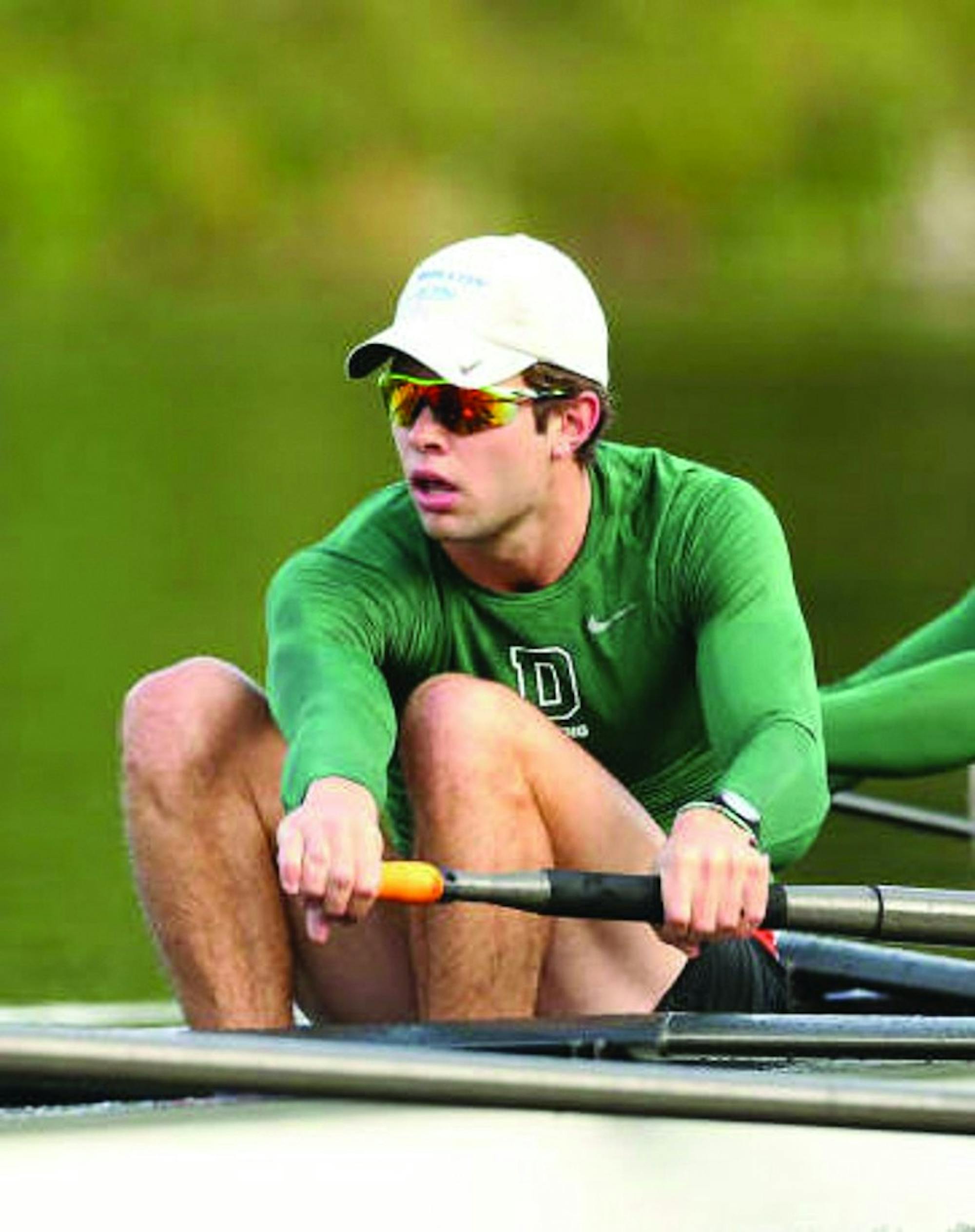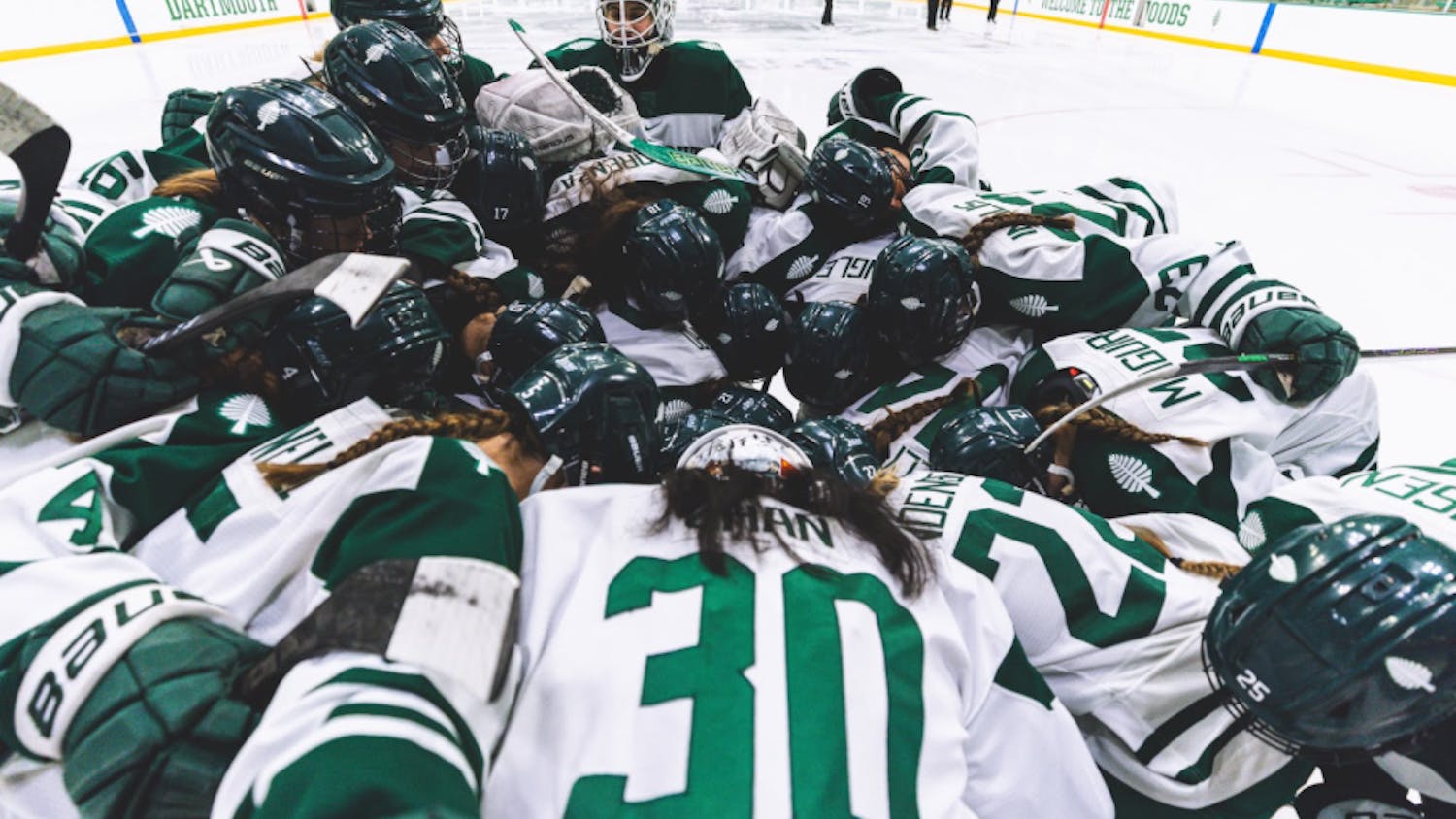If men’s heavyweight rowing captain Spencer Furey ’17 had his wish as a high school senior, he’d be spending his weekends on the tennis court instead of on the water.
Furey was a prep tennis standout at the Delbarton School in New Jersey. A natural athlete, Furey played football and basketball in his youth. When he broke his collarbone during his freshman year playing football, the right-handed Furey spent the following summer learning to play tennis left-handed. He committed to tennis full-time, and by his senior year, he was a standout on a Delbarton team that was one of the best squads in the tri-state area. In 2012, he went 32-0 at Delbarton’s No. 2 spot and made it to the quarterfinals of the New Jersey State Interscholastic Athletic Association singles tournament.
Despite performing well in the sport, Furey still felt like he was behind his peers.
“Tennis is a sport where you acquire the skills over a long period of time, and college recruiting begins pretty early on so I had trouble catching up with other kids that had been playing the sport longer than I had,” he said.
To follow his dream of playing in the Ivy League, Furey took a gap year to focus exclusively on tennis. He moved to south Florida, where he trained at the Saviano Tennis Academy and tried again to get recruited. Though he was not recruited to Dartmouth for tennis, Furey was admitted and accepted a spot in the Class of 2017.
“I wasn’t going to let the opportunity to go to Dartmouth slip by just because of tennis,” he said.
Furey was determined to fight for a walk-on spot on the team. But when he arrived, he found the men’s tennis team was full with recruits. No roster spots were left for walk-on players.
It was a disappointing end to Furey’s tennis career.
“I felt that I had spent all this time — I had taken a year off to hone my skills and I had come up short,” he said. “That was something that haunted me for those first couple weeks of school.”
The turn to rowing happened by chance. Furey recalls seeing a rowing poster that said “no experience required.” He met then-freshman coach Andrew Hilton ’99 at an informational meeting, and Hilton took an interest in him during the first several practices.
“The rest is history,” Furey says.
As it turns out, Furey was built for rowing. He’s got the physical tools, a 6-foot-4-inch frame and an abundance of raw power on the ergometer. After just a year of rowing, he was approaching an impressive erg score of six minutes for 2,000 meters. More importantly, Furey has a rower’s mentality, a self-described obsessive personality.
“Our sport is about enduring discomfort for extended periods of time,” men’s heavyweight rowing head coach Wyatt Allen said. “Our training is a lot of long, intense intervals on the rowing machine or on the water.”
In short, much of rowing is not fun. Not everyone can stand so many early mornings and so many miles, six days a week and two seasons a year. But the aspects that turn many away from rowing made it an attractive sport to Furey.
“It’s a competitive sport, it’s a sport where you can always keep getting better, it’s a sport that relies on toughness and those were the things that drew me to it,” he said.
Furey now laughs at the stark difference between tennis and rowing.
“If you tried to pick two more different sports, I don’t think you could,” he said.
But he attributes much of his mental toughness to what he learned on the court.
“Tennis can’t teach you how to compete — you either have that or you don’t — but it taught me the virtues of resolve and toughness that rowing prides itself on,” he said.
Allen came to Dartmouth in 2014 when Furey was a sophomore.
“He’s an athlete, and he’s very aware of his body,” Allen said. “He’s very coachable. You see it in his mental approach and the way he interacts with the team. He’s already been an athlete at a very high level, so he knows what it is to work hard and what it is to be part of an elite training group, so those things that he brought over from tennis have been the most impactful things to our team, as opposed to knowing how to hit a backhand slice.”
Allen — who walked on to the rowing team at the University of Virginia and went on to win two Olympic medals — said Furey’s walk-on-to-standout story is not uncommon. At the junior level, natural athletes gravitate to more popular sports like football and soccer. Because rowing requires more physical talent and somewhat less skill than other sports, Allen said, a top athlete from another sport can become a top rower. What often determines a walk-on’s success is whether the athlete warms to the grueling nature of rowing.
“That’s what I see in walk-ons who are really successful — they enjoy the training, they enjoy the type of work that we do and they don’t mind being uncomfortable for extended periods,” Allen said.
Along with the rest of the walk-ons, Furey was separated from recruited athletes during his freshman fall. While the other athletes competed in races, the walk-ons learned how to row until the winter, when they were brought into the fold.
“The willingness with which the recruited athletes were willing to welcome the walk-on guys and accept them into this rowing family is one of the strengths of the team,” Furey said.
He showed enough promise in his first year that he competed in the three seat of the varsity eight in his sophomore fall and part of the spring. The next year, he rowed with the varsity eight all season. This season, he is the captain of the team and sits in the stroke seat.
Tennis professional Jeff Daly, who has known Furey since he was 9 years old, saw him as a leader from an early age.
“He took a lot of the kids that I had that were willing to work to other places, and that’s a really neat thing to give back,” Daly said. “You see Furey out there playing now, he’s about to graduate college, and he’s out there playing with kids who are 10 or 11 years old and having fun with them.”
Furey takes a similar approach with his teammates on the water.
“He holds his teammates, his crewmates, to a pretty high standard, but he’s demanding without being a jerk,” Allen said. “For a lot of them, he’s head and shoulders above in terms of physiology and what he’s doing on the machine, but he doesn’t let it impact how he interacts with the rest of the group and he truly leads by example.”
Despite his success, Furey is quick to point out where he needs to improve. Just as he did in tennis, Furey came late to rowing, so he is not as technically proficient as some of his teammates.
“That’s where you see the fact that he didn’t row in high school show up — he’s still a bit green technically, but as I said, every week he gets a little better,” Allen said.
Furey will face tougher competition next year, which he will spend rowing and studying for a masters degree in history at Cambridge University. Then he aims to return to the national team training center in Princeton, New Jersey.
“I could see him rowing in the Olympics this quadrennium,” Allen said.
Furey has come a long way since he tried to walk on to the tennis team.
“If you had told me my first day at Dartmouth that I would be captain of the rowing team, I would have told you you were crazy,” Furey said.
As for tennis, it’s now just a hobby.
“It’s like riding a bike, it comes back,” Furey said. “I’ll play for the rest of my life.”




